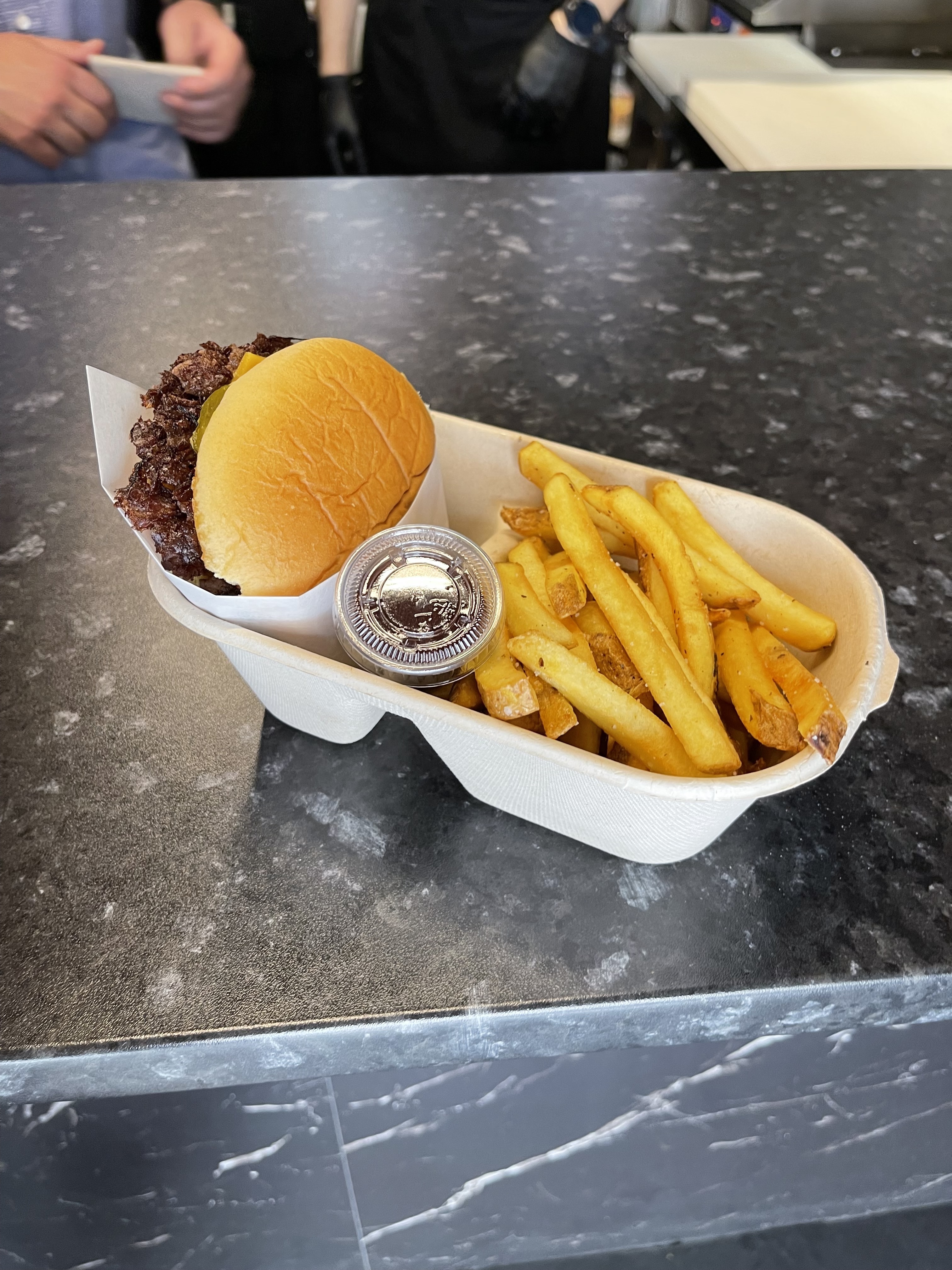If
Andrés and Juan Casanova have anything, it is a well-furnished head and well-marked entrepreneurial skills
-or almost- in their DNA.
Because these two twins (Caracas, 1978) have shared more than one business triumph in Spain since they met again seven years ago - after three fifteen years apart (one in Venezuela, the other in the United States) - in Madrid
with the dream of doing something together .
The dream came true, first with a project related to the parking industry that failed "spectacularly", recalls Andrés.
But since there is no better teacher than failure, they took advantage of the lesson and
in 2017 they launched Espicy
,
a hot sauce, with only six ingredients
, made in Murcia and a top seller on Amazon and on their own website.
They prepare only one type of hamburger.
After this kind of sriracha cañí, came
Mygo
, a mobility company with
electric scooters
to tour Madrid, which they sold to an American company.
And now, the Casanovas have found success again with
Pink's
:
a restaurant that only makes burgers to pick up on the premises and never sells more than 200 a day (at 8 euros each).
Two and a half months ago, they opened in the Chueca neighborhood
(Infantas, 40) this "hamburger restaurant that is different from the ones that work in Spain. We wanted it to be
close to a square and focused exclusively on take away
", explains Andrés, who from From this moment he becomes the narrator of
this story of family entrepreneurship.
Every day they mince fresh meat for 200 burgers.
After months of thinking about it, they found the place and 15 days later they opened Pink's.
But they did not do it lightly, but they made use of the accumulated experience.
"We operate as a technology startup
despite being a hamburger restaurant," says this multifaceted businessman who studied sound engineering in the US,
worked with Ricky Martin recording albums
and even created his own financial consultancy in the complicated US market.
Faced with the
boom
in gourmet
burgers
that have reigned in Madrid for a few years, Andrés and
Juan -chef trained at Le Cordon Bleu Paris
and with business experience in their country in food production- have opted for the
ultra smash burgers
, which are They are made by crushing the ball of minced meat on the grill.
The 'ultra smash burgers' on the grill.
"We like to eat several hamburgers better than one big fat one."
In addition, they refer to the
style that became popular in the United States "after the Great Depression.
They crushed the meat to make it look like more quantity," Andrés details.
Added to this is a predilection for the classic
diners
, "but not because of their neon signs, but because
of the proximity to the customer and the product
."
For this reason, in this small 23-square-meter venue, everything is in sight, without trickery or cardboard.
"You witness how they are prepared step by step: the bread is toasted with the butter; the
smasher
works the meat that
is done in seconds with its own fat,
which causes the Maillard reaction and
caramelizes the meat on the outside
... The result is a
very thin, juicy and extra-crunchy burger,
" he describes.
Followers of the "less is more" doctrine, the Casanovas opt for
a single hamburger, simple rather than simple
, with few ingredients and of great quality: potato starch bread (American and with a recipe of more than 60 years),
two pieces of matured beef
(from a Madrid supplier), cheese (also
made in the USA
), chopped sweet onion, pickles (domestic), ketchup and mustard.
"Those are the basics of a perfect hamburger,
reminiscent of childhood
," he stresses.
To accompany, if you want, some fries.
The burger almost finished assembling.
We continue with more singularities of the project: they only dispatch 200 units daily.
"100 on the noon shift and 100 on the night shift."
The number is not a whim, but a principle linked "to the quality of the product. We flee from the overcrowded,
we cannot and do not want to make a thousand hamburgers.
Every day we take the meat, fresh, prepare it and chop it".
What if they don't sell?
-That's something that hasn't happened yet, but if it did, we wouldn't keep them.
If we put together a hamburger wrong, we throw it away.
One of our commandments is that we do not negotiate excellence and we apply that to everything.
One more precept: "Do not give up closeness, familiarity with the client".
For this reason,
delivery is not among his plans
.
"For us it is very important to deliver the food to the customer knowing that it has the quality we want."
The Casanova brothers outside Pink's.
Pink
's was not born with the idea of growing big
.
"The goal was to apply the principles of a technology company, how to make an amazing product and see what the market tells us."
And according to the response, he and the public have spoken loud and clear ("although the first hamburger was not the prettiest, but over time
we have perfected the smashing technique
"
)
: two weeks after opening, they The offers of franchises, investments, delivery...
"We sell
burgers
, yes, but
we see ourselves as that neighborhood cafeteria
, close to the customer and to which one always returns."
With this line of work, the twins already have their own expansion plan "quite aggressive.
We are going to open about 30 stores in Madrid
. We don't know if it will be in six months or 18."
What they do know is that
in a couple of weeks there will be a Pink's in the Ponzano area
and that, like the one in Chueca, they will only make 200 hamburgers a day to wear them.
Conforms to The Trust Project criteria
Know more

